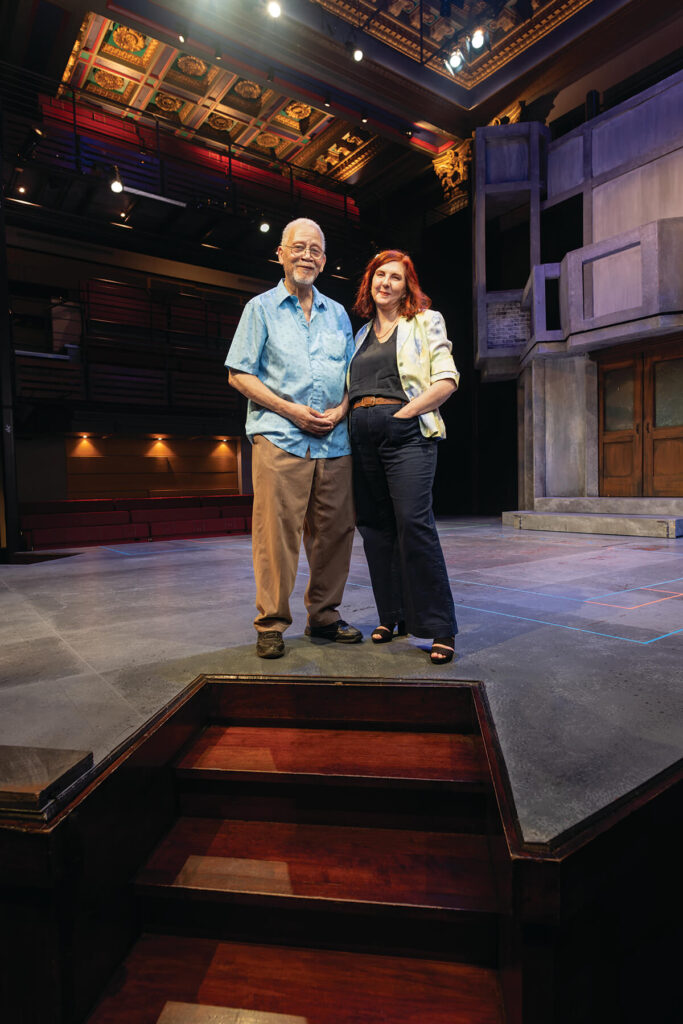Baltimore Thespians Unite to Honor to August Wilson, “Theater’s Poet of Black America”
As part of the Baltimore August Wilson Celebration, several of the city’s theaters will perform works from the prolific playwright’s 10-part American Century Cycle series.
By Laura Farmer | August 2024
Originally published in Baltimore Magazine in their August 2024 Issue

Lesley Malin will never forget the moment she met August Wilson. It was 1988, and she was giving the student commencement speech for Washington University in St. Louis, sharing the stage that day with the renowned playwright, who was receiving an honorary degree.
“I had not seen any of his work yet, but he was really lovely to me,” says Malin, pictured right, who was told afterwards that he had complimented her speech. The encounter left an indelible impression on the aspiring thespian, who went on to see a number of his Broadway premieres in the early days of her career, before eventually co-founding Baltimore’s Chesapeake Shakespeare Company, where she now serves as producing executive director.
“Over time, he’s become this towering figure in American theater,” she says. “I admire his work very deeply.”
August Wilson has been dubbed “theater’s poet of Black America,” distinguished for his powerful and poignant portrayal of the African-American experience. In his magnum opus, a 10-part series known collectively as the American Century Cycle, each play captures one decade of the 20th century— like Ma Rainey’s Black Bottom in the 1920s or Fences in the 1950s—altogether depicting 100 years of Black life through both fictional and fictionalized characters from Wilson’s native Pittsburgh.
In fact, it had long been a dream of Malin’s to perform this epic collection chronologically in theaters across Baltimore. She started reaching out to other companies, who met her inquiries with enthusiasm.
This past April, the Baltimore August Wilson Celebration presented the first performance of the full American Century Cycle, now running through 2027. It’s a collaboration among several of the city’s theaters, including the Everyman Theatre, Fells Point Corner Theatre, Baltimore Center Stage, and ArtsCentric.
It all began at Arena Players, the oldest continuously operating African-American community theater in the United States, which, in a stroke of good luck, was already scheduled to perform Gem of the Ocean, set in the first decade of the 1900s.
“We had a full house every night. It’s a beautiful piece—it’s funny, it’s sad, it can be very painful,” says Donald Owens, artistic director at Arena Players, pictured left. “People appreciated the fact that this was history that was never told.”
Up next is Chesapeake Shakespeare Company’s production of Joe Turner’s Come and Gone, which is set in 1911 against the historical backdrop of the Great Migration, running from September 20 through October 13. It’s the first August Wilson play that the troupe has performed, but “we consider him to be a classic playwright on the level of William Shakespeare,” says Malin. “He is known for writing these arias of self-recognition. In [this work,] we see a man who’s been just so abused and repressed. And he finally bursts out and is able to recognize his song.”
Meanwhile, Arena Players has performed nearly all of Wilson’s works over the years, and Owens appreciates his skill as a storyteller, with narratives that draw in diverse audiences for their universal humanity.
“He’s telling the story of Black culture, but white people also are drawn to the story because he’s a good writer, and it’s good storytelling,” he says. “I think he was a truthful writer. He wrote about things that were very painful, yet he always instilled hope.”
Wilson’s ability to recognize a shared humanity has managed to bolster the local arts community as well.
“Baltimore is a very cultured city, but the cultures have not always worked together,” he says. “Now we see all of these theaters coming together because of August Wilson.”
